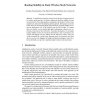Free Online Productivity Tools
i2Speak
i2Symbol
i2OCR
iTex2Img
iWeb2Print
iWeb2Shot
i2Type
iPdf2Split
iPdf2Merge
i2Bopomofo
i2Arabic
i2Style
i2Image
i2PDF
iLatex2Rtf
Sci2ools
121
Voted
PAM
2007
Springer
2007
Springer
Routing Stability in Static Wireless Mesh Networks
Considerable research has focused on the design of routing protocols for wireless mesh networks. Yet, little is understood about the stability of routes in such networks. This understanding is important in the design of wireless routing protocols, and in network planning and management. In this paper, we present results from our measurement-based characterization of routing stability in two network deployments, the UCSB MeshNet and the MIT Roofnet. To conduct these case studies, we use detailed link quality information collected over several days from each of these networks1 . Using this information, we investigate routing stability in terms of route-level characteristics, such as prevalence, persistence and flapping. Our key findings are the following: wireless routes are weakly dominated by a single route; dominant routes are extremely short-lived due to excessive route flapping; and simple stabilization techniques, such as hysteresis thresholds, can provide a significant improve...
Computer Networks | PAM 2007 | Routing Protocols | Wireless Mesh Networks | Wireless Routing Protocols |
Related Content
| Added | 09 Jun 2010 |
| Updated | 09 Jun 2010 |
| Type | Conference |
| Year | 2007 |
| Where | PAM |
| Authors | Krishna N. Ramachandran, Irfan Sheriff, Elizabeth M. Belding, Kevin C. Almeroth |
Comments (0)

